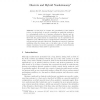Free Online Productivity Tools
i2Speak
i2Symbol
i2OCR
iTex2Img
iWeb2Print
iWeb2Shot
i2Type
iPdf2Split
iPdf2Merge
i2Bopomofo
i2Arabic
i2Style
i2Image
i2PDF
iLatex2Rtf
Sci2ools
100
click to vote
HYBRID
2004
Springer
2004
Springer
Discrete and Hybrid Nonholonomy
In this paper we consider the generalization of the classical notion of nonholonomy of smooth constraints in analytical mechanics, to a substantially wider set of systems, allowing for discrete and hybrid (mixed continuous and discrete) configurations and transitions. We show that the general notion of nonholonomy can be captured by the definition of two different types of nonholonomic behaviours, which we call internal and external, respectively. Examples are reported of systems exhibiting either the former only, or the latter only, or both. For some classes of systems, we provide equivalent or sufficient characterizations of such definitions, which allow for practical tests.
Related Content
| Added | 01 Jul 2010 |
| Updated | 01 Jul 2010 |
| Type | Conference |
| Year | 2004 |
| Where | HYBRID |
| Authors | Antonio Bicchi, Alessia Marigo, Benedetto Piccoli |
Comments (0)

